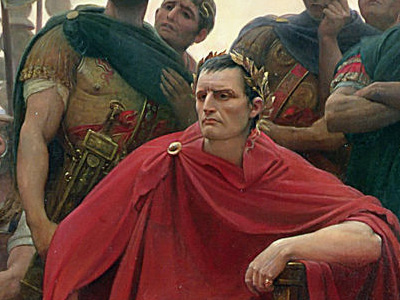Julius Caesar (100-44 BC)
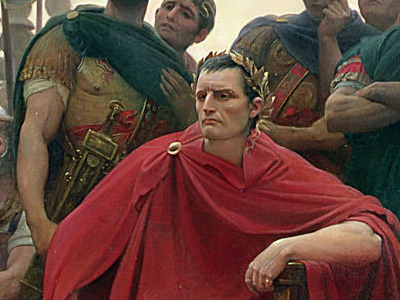
Assassination
On the Ides of March (15 March; see Roman calendar) of 44 BC, Caesar was due to appear at a session of the Senate. Several Senators had conspired to assassinate Caesar. Mark Antony, having vaguely learned of the plot the night before from a terrified liberator named Servilius Casca, and fearing the worst, went to head Caesar off. The plotters, however, had anticipated this and, fearing that Antony would come to Caesar's aid, had arranged for Trebonius to intercept him just as he approached the portico of the Theatre of Pompey, where the session was to be held, and detain him outside. (Plutarch, however, assigns this action to delay Antony to Brutus Albinus.) When he heard the commotion from the Senate chamber, Antony fled.
According to Plutarch, as Caesar arrived at the Senate, Tillius Cimber presented him with a petition to recall his exiled brother. The other conspirators crowded round to offer support. Both Plutarch and Suetonius say that Caesar waved him away, but Cimber grabbed his shoulders and pulled down Caesar's tunic. Caesar then cried to Cimber, "Why, this is violence!" ("Ista quidem vis est!").
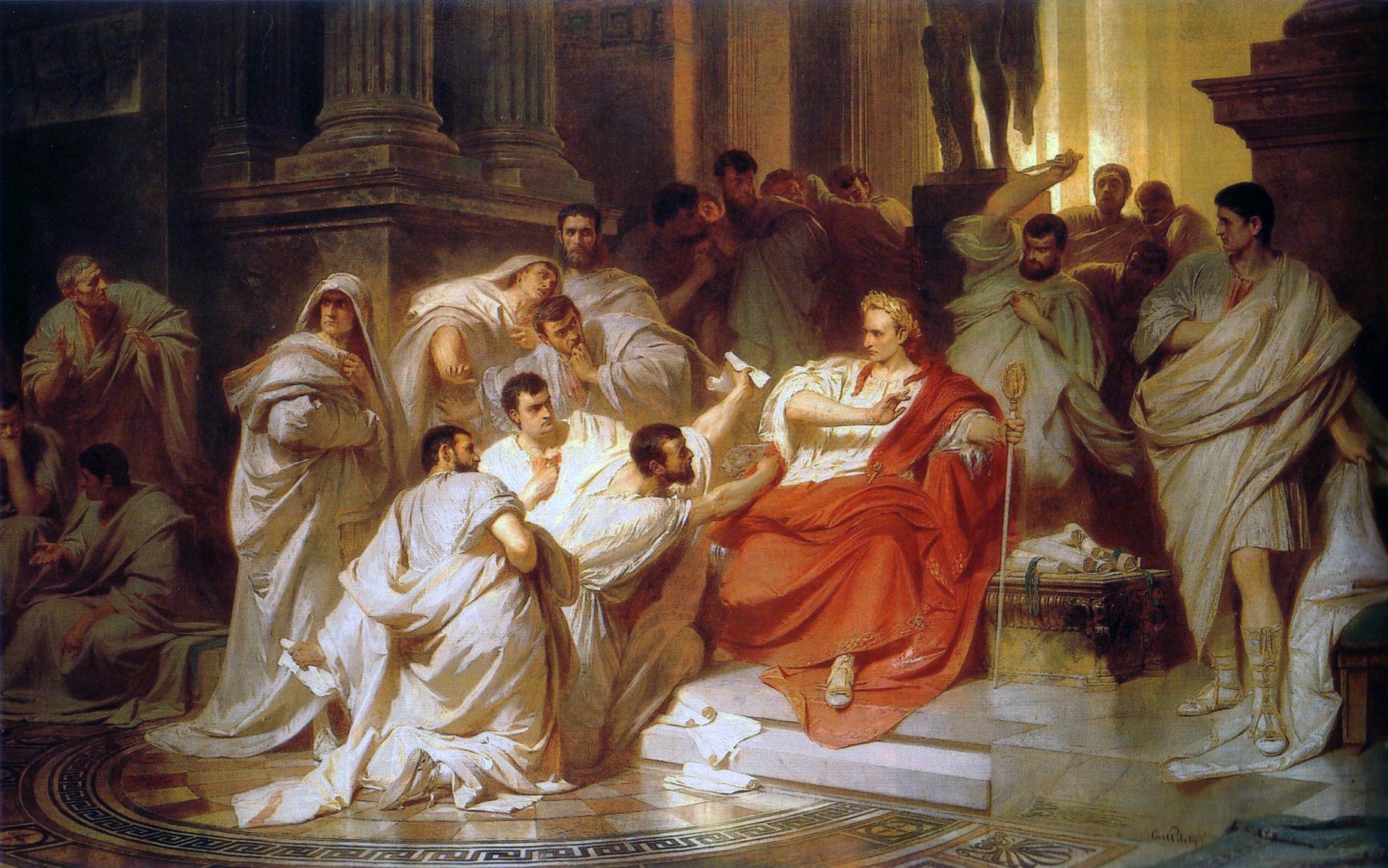
The senators encircle Caesar, a 19th-century interpretation of the event by Carl Theodor von Piloty
At the same time, Casca produced his dagger and made a glancing thrust at the dictator's neck. Caesar turned around quickly and caught Casca by the arm. According to Plutarch, he said in Latin, "Casca, you villain, what are you doing?" Casca, frightened, shouted, "Help, brother!" in Greek ("ἀδελφέ, βοήθει", "adelphe, boethei"). Within moments, the entire group, including Brutus, was striking out at the dictator. Caesar attempted to get away, but, blinded by blood, he tripped and fell; the men continued stabbing him as he lay defenceless on the lower steps of the portico. According to Eutropius, around 60 men participated in the assassination. He was stabbed 23 times.
According to Suetonius, a physician later established that only one wound, the second one to his chest, had been lethal. The dictator's last words are not known with certainty, and are a contested subject among scholars and historians alike. Suetonius reports that others have said Caesar's last words were the Greek phrase "καὶ σύ, τέκνον;" (transliterated as "Kai su, teknon?": "You too, child?" in English). However, for himself, Suetonius says Caesar said nothing.
Plutarch also reports that Caesar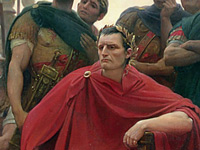 Julius Caesar (100-44 BC), was a Roman politician and general who played a critical role in the events that led to the demise of the Roman Republic and the rise of the Roman Empire. Caesar is considered by many historians to be one of the greatest military commanders in history. Julius Caesar » said nothing, pulling his toga over his head when he saw Brutus among the conspirators. The version best known in the English-speaking world is the Latin phrase "Et tu, Brute?" ("And you, Brutus?", commonly rendered as "You too, Brutus?"); this derives from Shakespeare's Julius Caesar, where it actually forms the first half of a macaronic line: "Et tu, Brute? Then fall, Caesar." It has no basis in historical fact and Shakespeare's use of Latin here is not from any assertion that Caesar would have been using the language, rather than the Greek reported by Suetonius, but because the phrase was already popular when the play was written, it appears in Richard Edes's Latin play Caesar Interfectus of 1582 and The True Tragedie of Richarde Duke of Yorke and etc. of 1595, Shakespeare's source work for other plays.
Julius Caesar (100-44 BC), was a Roman politician and general who played a critical role in the events that led to the demise of the Roman Republic and the rise of the Roman Empire. Caesar is considered by many historians to be one of the greatest military commanders in history. Julius Caesar » said nothing, pulling his toga over his head when he saw Brutus among the conspirators. The version best known in the English-speaking world is the Latin phrase "Et tu, Brute?" ("And you, Brutus?", commonly rendered as "You too, Brutus?"); this derives from Shakespeare's Julius Caesar, where it actually forms the first half of a macaronic line: "Et tu, Brute? Then fall, Caesar." It has no basis in historical fact and Shakespeare's use of Latin here is not from any assertion that Caesar would have been using the language, rather than the Greek reported by Suetonius, but because the phrase was already popular when the play was written, it appears in Richard Edes's Latin play Caesar Interfectus of 1582 and The True Tragedie of Richarde Duke of Yorke and etc. of 1595, Shakespeare's source work for other plays.
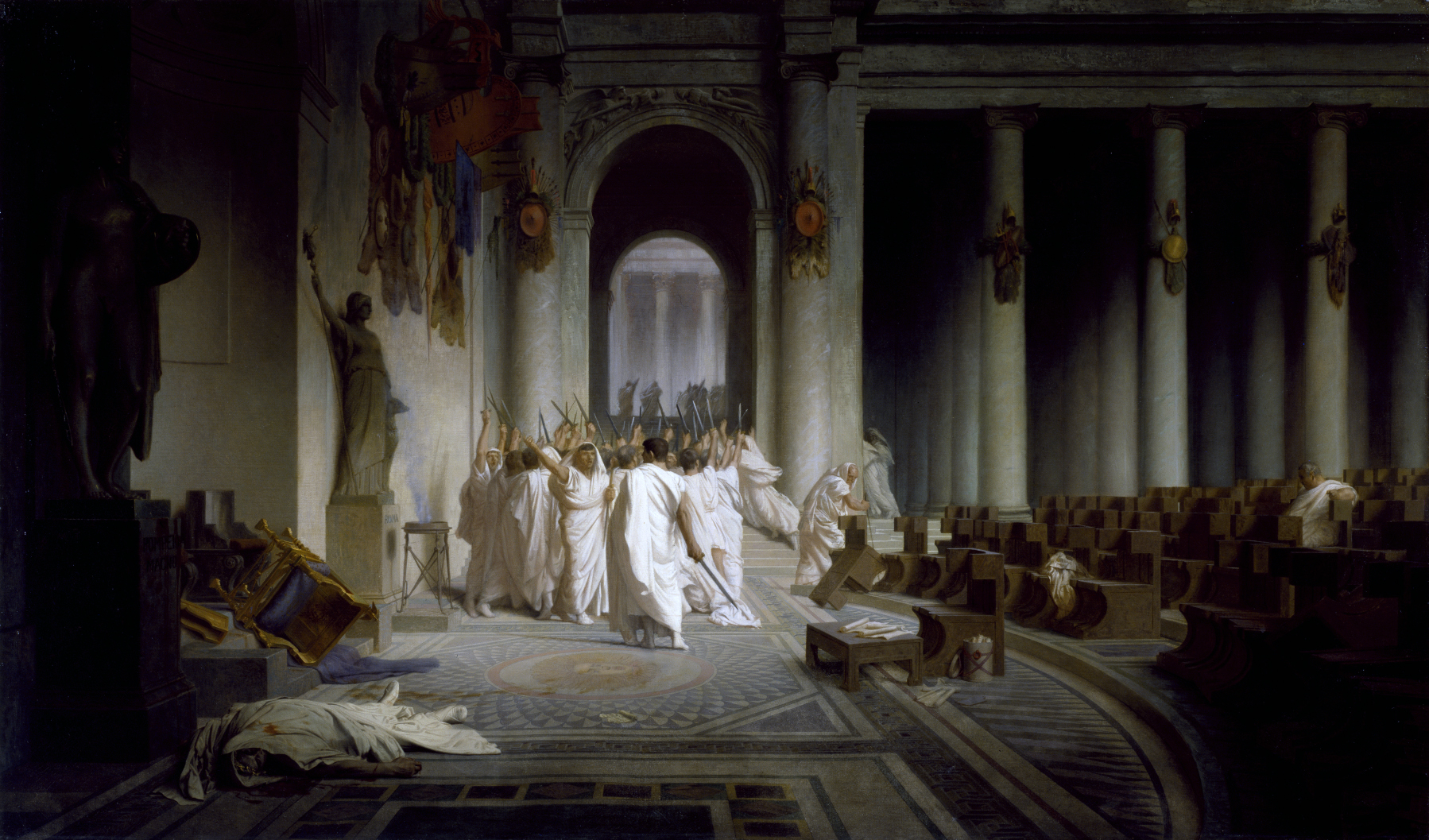
The Death of Caesar, Jean-Léon Gérôme, 1867
According to Plutarch, after the assassination, Brutus stepped forward as if to say something to his fellow senators; they, however, fled the building. Brutus and his companions then marched to the Capitol while crying out to their beloved city: "People of Rome, we are once again free!" They were met with silence, as the citizens of Rome had locked themselves inside their houses as soon as the rumour of what had taken place had begun to spread. Caesar's dead body lay where it fell on the Senate floor for nearly three hours before other officials arrived to remove it.
Caesar's body was cremated, and on the site of his cremation, the Temple of Caesar was erected a few years later (at the east side of the main square of the Roman Forum). Only its altar now remains. A life-size wax statue of Caesar was later erected in the forum displaying the 23 stab wounds. A crowd who had gathered there started a fire, which badly damaged the forum and neighbouring buildings. In the ensuing chaos, Mark Antony, Octavian (later Augustus Caesar), and others fought a series of five civil wars, which would end in the formation of the Roman Empire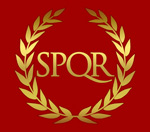 The Roman Empire was the post-Republican period of ancient Rome. As a polity, it included large territorial holdings around the Mediterranean Sea in Europe, North Africa, and Western Asia, and was ruled by emperors. The first two centuries of the Roman Empire saw a period of unprecedented stability and prosperity known as the Pax Romana ('Roman Peace'). The Empire was later ruled by multiple emperors who shared control over the Western Roman Empire and the Eastern Roman Empire..
The Roman Empire was the post-Republican period of ancient Rome. As a polity, it included large territorial holdings around the Mediterranean Sea in Europe, North Africa, and Western Asia, and was ruled by emperors. The first two centuries of the Roman Empire saw a period of unprecedented stability and prosperity known as the Pax Romana ('Roman Peace'). The Empire was later ruled by multiple emperors who shared control over the Western Roman Empire and the Eastern Roman Empire..
HISTORY
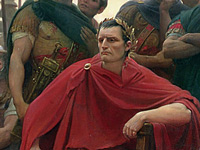
RESOURCES
This article uses material from the Wikipedia article "Julius Caesar", which is released under the Creative Commons Attribution-Share-Alike License 3.0.
© Stories Preschool. All Rights Reserved.
